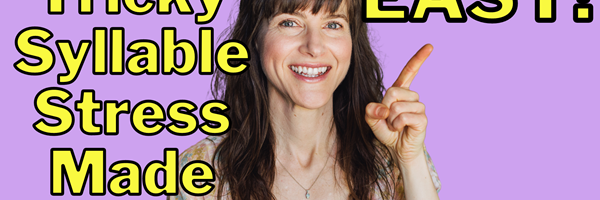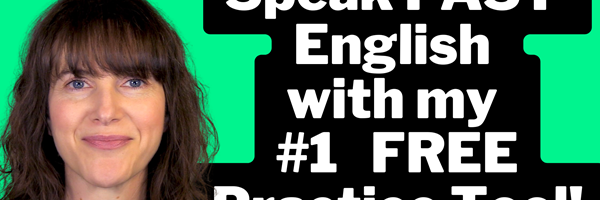(Video Transcript)
Business. Chocolate. Memory. Family. What do all of these words have in common? Somewhere in each of these words, a vowel is dropped from the pronunciation. An entire syllable just vanishes - poof! - gone.
Hi, I’m Julie with San Diego Voice and Accent, and today you’ll learn all about dropped syllables in American English.
Dropped syllables in American English (aka vowel syncope)
The process of dropping syllables from the pronunciation of a word is called vowel syncope, which basically means that an unstressed vowel is dropped from the pronunciation of a word. It’s tricky because the spelling of the word looks as if you should pronounce that vowel - business is spelled with a letter I in the middle - but it’s not in the pronunciation.
You may have already known about business and chocolate. But there are so many more words in which vowel syncope can occur, and there is no way of knowing when to use it based on the spelling.
Who created this pronunciation rule? Why does it happen? And most importantly, when does it happen?
Well, I can’t give you all of these answers. I don’t know who created vowel syncope, and the reason why it happens is too complex to discuss in this video. But I can help you with the last question.
In this video, I’ll discuss when vowel syncope occurs, and you’ll practice a few of the most common words in which it can occur. And after this video, you’ll know how to use vowel syncope to sound more natural and fluent when you speak American English.
We just practiced vowel syncope in my last English class at Julie’s Conversation Club, so if you want to learn more about vowel syncope and other areas of American English pronunciation, you should join the Conversation Club. We meet every week for live lessons, and I work individually with each participant on their pronunciation. It’s a really fun class, and it’s a great way to receive individual feedback on your English skills. You can learn more about Julie’s Conversation Club here.
Ok, back to vowel syncope. When does it happen? There’s no absolute rule that says “one hundred percent of the time, vowel syncope will occur”; it doesn’t work that way, unfortunately. But, when you look at the words that have vowel syncope in their pronunciation, it’s always an unstressed or weak vowel that is dropped. And when that vowel is dropped from the pronunciation, the syllable is dropped as well. So as we practice vowel syncope in this video, you’ll notice two things: number one, an unstressed or weak vowel is dropped from the pronunciation, and number two, this also results in a syllable being dropped from the pronunciation.
There’s one more thing to discuss before we start the practice. The words that have vowel syncope fall into two main groups. In one group of words, the most common pronunciation uses vowel syncope, and most native speakers prefer to use this pronunciation. The word business falls into this group. Every native speaker I’ve ever met pronounces business as business, not busyness. In fact, busyness is an entirely different word in American English, so if you pronounce business like busyness, you may confuse your listening partner.
In the second group of words, the pronunciation can go either way, depending on the preferences of the speaker and the context of the conversation. Some native speakers may choose to use vowel syncope and drop the unstressed syllable; other speakers may prefer to pronounce each of the syllables. The word family falls into this group. Many native speakers pronounce this as fam-lee, but others pronounce it like fam-uh-lee. Both pronunciations are correct; it just depends on the speaker and the context.
Let’s start the practice. First, you’ll learn 4 words that fall into group number one. These words all use vowel syncope in the preferred pronunciation. Then you’ll learn 4 words that fall into group number two. These words can go either way - some speakers drop the weak or unstressed vowel, and other speakers don’t.
Here are four words from group number one. All of these words use vowel syncope in their pronunciation, and that is the most common pronunciation.
How to pronounce evening
Word number one is evening. Good evening. Let’s meet at six this evening. Evening.
It looks like ev-en-ing, like it should be three syllables. But it’s not. The best pronunciation to use is eve-ning. The middle “e” is dropped from the pronunciation, and evening is pronounced as two syllables.
Evening. Meet me at six this evening. Have a good evening.
Here it is, up close and in slow motion.
Evening
But what if you didn’t know that evening was pronounced like evening - how could you find out? One way to find out is to ask a native speaker, but maybe you don’t know any native speakers of English. Then what? Here are two free ways you can find out how to pronounce a word in English. The first is to go to Youglish.com. This is a great website that will give you hundreds or thousands of video clips of people using any word or phrase you’re interested in learning about. Just be sure to filter your results by US to hear American English.
You can also go to Forvo.com to hear native speakers pronounce words and phrases. Just be sure to click American to hear the American accent.
And don’t forget there’s a fourth option. Come to my English classes at Julie’s Conversation Club. I’d be happy to help you with the pronunciation of these tricky words.
How to pronounce Wednesday
Now onto word number two. Wednesday. Today is Wednesday. I’ll see you next Wednesday. Wednesday.
You may already know the pronunciation of this word because it’s a fairly common word in English, but many of my accent clients have said that they don’t feel confident when pronouncing this word because the spelling is so different from the pronunciation.
So let’s break it down: Wenz -day. Wenz-day. Both the D and the E have been dropped from the pronunciation in this word. It’s two syllables, even though it looks like it should be three. It’s not Wed-nes-day. It’s wenz-day. Today is Wednesday. I’ll see you next Wednesday.
Here it is in slow motion.
Wednesday.
How to pronounce temperature
Word number three is temperature. I feel hot - I must have a temperature. The temperature today is 80 degrees. Temperature.
It looks like it should be four syllables: temp-er-a-ture. But it’s not, it’s temperature. Three syllables, and the “a” is dropped from the pronunciation. Temperature. Notice how the middle and final syllables share the same ER vowel: temp-er-chure, even though the middle syllable is spelled with an er and the last syllable is spelled with a ur.
Temperature. I feel hot - I must have a temperature. The temperature today is 80 degrees.
Here it is in slow motion.
How to pronounce comfortable
Word number four is comfortable. My new shoes are really comfortable. This bed is not comfortable. Comfortable
I’ve discussed the pronunciation of this word in a previous video, but it is such a commonly mispronounced word that I wanted to include it again in this video.
It looks like it should be four syllables: com-for-ta-ble. But it’s not. It’s three syllables: Comf-ter-ble. The pronunciation of this word is very different from the way it’s spelled, so don’t look at the spelling. Just imitate me: comfortable.
There are a few big changes to the pronunciation of this word. The first syllable has a tricky consonant combination, the MF cluster. It sounds like this: comf. Comf. comf. Just practice that a few times until you feel comfortable with that combination.
Then the middle syllable is ter, but in fast speech, the T turns into the flap. Der.
The letter “a” is gone from the pronunciation, so that leaves the final syllable as bl. Bl. Just a B consonant and a dark L. Comfortable.
My new shoes are really comfortable. This bed is not comfortable.
Here it is, up close and in slow motion.
Comfortable.
Now for group two. The pronunciation of these words can go either way. Some speakers use vowel syncope, and some speakers don’t, and some speakers will use both pronunciations depending on the context of the conversation.
How to pronounce Catholic
Word number one is Catholic. Or is it Cath-uh-lic. The Catholic Church is down the street. The Catholic Church is down the street.
I prefer to use the pronunciation with vowel syncope. Catholic. The middle “o” is dropped from the pronunciation, and I think this is the more common pronunciation that most native speakers use. Catholic. However, you might hear someone say Cath-uh-lic. Cath-uh-lic. But I’d recommend that you use the pronunciation with vowel syncope. Catholic, as two syllables. The Catholic church is down the street.
Here it is in slow motion.
Catholic.
How to pronounce camera
Word number two is camera. Or is it ca-mer-uh? I bought a new camera. I bought a new ca-mer-uh.
I prefer to use the pronunciation with vowel syncope. Camera. The middle “e” is dropped from the pronunciation, and it is pronounced as two syllables. Camera. I think this is also the more common pronunciation of most native speakers; however, you may hear someone say cam-er-uh. But I’d recommend that you use the pronunciation with vowel syncope. Camera, as two syllables. I bought a new camera.
Here it is in slow motion
Camera.
How to pronounce practically
Word number three is practically. Or is it prac-tic-cuhl-ly? You know practically everyone in this town. You know prac-tic-kuh-lee everyone in this town.
I prefer to use the pronunciation with vowel syncope. Practically. The second “a” is dropped from the pronunciation, and it is pronounced as three syllables. Practically. I think this is the more common pronunciation that most native speakers use in their daily conversations, but you may hear someone say prac-tic-cul-ly. However, I’d recommend that you use the pronunciation with vowel syncope. Practically, as three syllables. You know practically everyone in this town.
Here it is in slow motion.
Practically.
How to pronounce probably
And the final word of group two is probably. Or is it pro-buh-bly? I can probably do it on Tuesday. I can pro-buh-bly do it on Tuesday.
Hmm, this is a hard one. I use both pronunciations. Probably. Pro-buh-bly. I’ll say them again: can you hear the difference? Probably. Probably. You can pronounce it as two syllables: prah-bly, and in this pronunciation the middle “a” is dropped from the pronunciation. Or you can pronounce the middle “a”: prah-buh-bly.
Most of my accent clients are unfamiliar with the two-syllable pronunciation, probably. So here it is, up close and in slow motion.
Probably.
Great job! Thanks so much for watching - I hope you enjoyed this video! And remember, if you’re ready to practice your pronunciation with me, join my next live class at Julie’s Conversation Club; the details are below.
And I'd love to hear from you - contact me to learn how we can work together to perfect your American English pronunciation!



